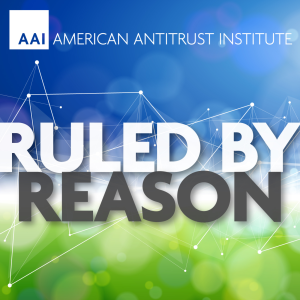
Ruled by Reason
Business & Economics Podcasts
The American Antitrust Institute’s Ruled by Reason podcast explores current topics in progressive antitrust with experts from enforcement, business, and academia. Ruled by Reason guests discuss and debate the benefits of competition for markets, consumers, and workers. We delve into the importance of antitrust enforcement for promoting competition in our markets and democratic values in civil society.
Location:
United States
Description:
The American Antitrust Institute’s Ruled by Reason podcast explores current topics in progressive antitrust with experts from enforcement, business, and academia. Ruled by Reason guests discuss and debate the benefits of competition for markets, consumers, and workers. We delve into the importance of antitrust enforcement for promoting competition in our markets and democratic values in civil society.
Twitter:
@AntitrustInst
Language:
English
Monopolizing by Conditioning: A Conversation Between Jack Kirkwood and Daniel Francis, Jerry S. Cohen Award Winner for Antitrust Scholarship
Duration:00:45:47
Applying Computer Science Principles to Police Modern Cartels: A Conversation with Giovanna Massarotto
Duration:00:38:21
Experts, Daubert, and Judicial Gatekeeping: A Conversation with Edoardo Peruzzi and Christine Bartholomew
Duration:00:52:36
How the Agri-Stats Case Can Help Shape Treatment of Anticompetitive Information Exchanges: A Discussion Between Emily Bridges of the Food and Agriculture Impact Project and Professor Peter Carstensen
Duration:00:54:30
Competition, Fairness, and Regulation in Food & Agriculture: A Conversation with Andy Green, Senior Advisor for Fair and Competitive Markets at the U.S. Department of Agriculture
Duration:00:47:43
How Exactly Does Common Ownership Harm Competition? A Conversation with Florian Ederer, Jerry S. Cohen Award Winner for Antitrust Scholarship
Duration:00:33:03
International Update: Checking In with ICN's Cartel Working Group
Duration:00:59:39
Default Status/De Facto Exclusion: What does a Rival Search Company Have to Say About the Google Case?
Duration:00:52:26
Praise and Constructive Criticism: The Pro-Enforcement Community Weighs in on the Draft Merger Guidelines
Duration:00:41:47
How Should Antitrust Tackle Antitrust’s “Duty to Deal” in the Tech Sector? A Conversation With Erik Hovenkamp, 2023 Jerry S. Cohen Award Winner for Antitrust Scholarship
Duration:00:36:18
Unpacking the 2023 Revised Merger Guidelines: A Conversation With the U.S. Department of Justice
Duration:00:48:15
The Cloud Technology Market: Storm of Innovation or Rainy Days for Competition?
Duration:00:37:08
How Do We Fix the Competition Problem in Shipping? The Role for Private Actions under the Shipping Act
Duration:00:47:04
Private Equity’s Impact on Physician Practices: Unpacking Markets, Competition, and Prices
Duration:00:54:55
Private Equity’s Impact on Physician Practices: Unpacking Markets, Competition, and Prices
Duration:00:55:08
Powerful Buyers and the Grocery Supply Chain: What Does it Mean for the Independent Grocer?
Duration:00:42:46
Airline Consolidation and Labor A View From the Cockpit
Duration:00:43:12
Taking Stock of Merger Enforcement Under the Biden Agencies: A Conversation With Steven Salop
Duration:00:48:25
Antitrust Reform from Within the Federal Antitrust Agencies: Navigating Institutional Dynamics in Implementing Policy Shifts
Duration:00:59:12
Antitrust and “Agnosticism”: How Enforcers Think About Cases in Markets With Outsize Impact on Society, Human Health, and Vulnerable Groups
Duration:00:41:55